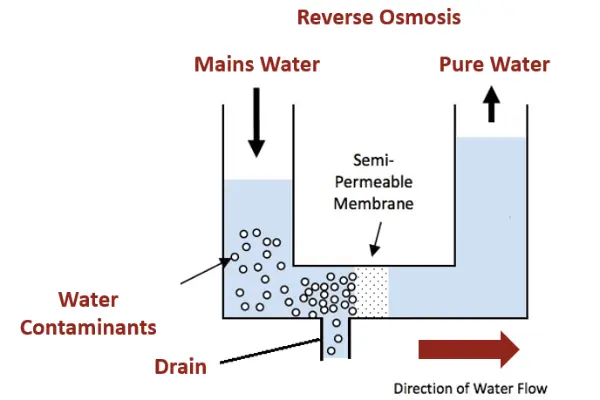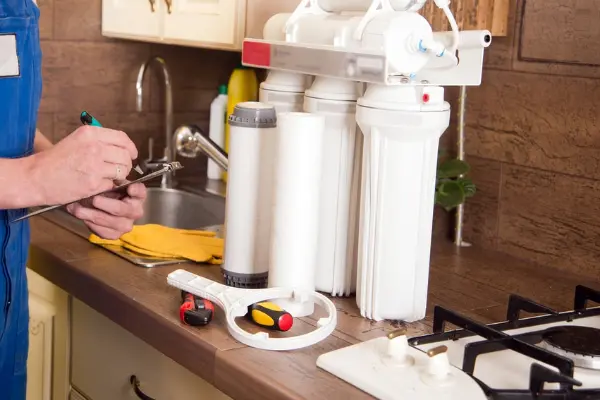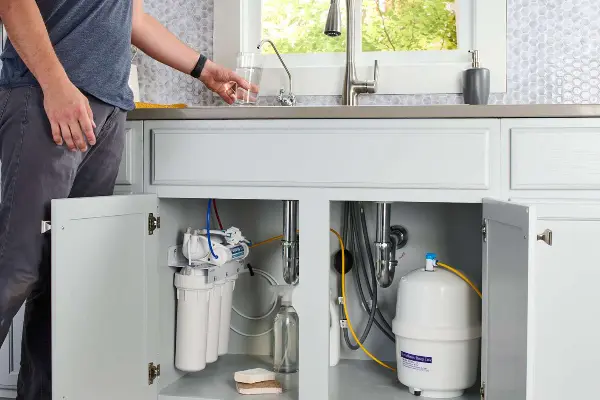Water is the most essential element of life, but not all bodies of water are the same. Some contain substances, contaminants and impurities that we would rather not have in our water. Reverse osmosis is a proven technology for purifying drinking water. Read more…
The taste of pure water: Explore the role of reverse osmosis in water quality
In our quest for purity and health, water stands at the forefront of our daily consumption. Yet, not all water supplies quench our thirst for quality and safety. Enter the realm of reverse osmosis (RO), a proven purification technology that offers a solution for those seeking the purest water possible.
Delve into the science behind RO. First, we touch on the basics of how it works. Second, we are looking at the profound benefits it offers. Lastly, we invite you to explore reverse osmosis’s critical role in delivering water quality. Discover why our specialists, with over two decades of expertise, are your go-to choice for seamless RO system installations and maintenance. Whether you’re concerned about contaminants, taste, or overall water safety, our team guides you every step of the way.
Therefore, join us on a journey to elevate your water experience, sip by sip! Let’s explore the transformative power of reverse osmosis.
Reverse Osmosis filter systems for pure water bliss
Aqua Works has more than 20 years of experience in RO water filtration. Thus, our team is proficient in designing, installing and servicing Reverse Osmosis water filter systems.
What is Reverse Osmosis?
Reverse Osmosis (RO) is a proven water purification method. Thereby, it employs a semi-permeable membrane to eliminate impurities and contaminants, producing exceptionally pure water. This process is rooted in the natural phenomenon of osmosis. It reverses the flow of solvent molecules by applying external pressure through a specialized membrane.
Ultimately, the RO system relies on this semi-permeable membrane, selectively allowing only water molecules to pass through. At the same time, it obstructs the passage of dissolved salts, minerals, and other unwanted substances. This versatile technology finds applications in desalinating seawater, municipal water treatment, residential water purification, and industrial processes.
How does RO work?
1. Pre-filtration: Typically, the process initiates with pre-filtration to remove larger particles and sediments, safeguarding the delicate semi-permeable membrane from potential damage.
2. Pressurisation: The subsequent step involves pressurising the water using a pump. This pressure is crucial in counteracting the natural osmotic pressure, compelling water molecules through the membrane.
3. Semi-permeable Membrane: The central element of the reverse osmosis system is the semi-permeable membrane. As pressurised water traverses this membrane, it acts as a discerning barrier, permitting only water molecules to pass while obstructing impurities like salts, minerals, bacteria, and other contaminants.
4. Separation of Clean Water and Reject Water: Purified water successfully passing through the membrane is collected, while concentrated impurities remain on the other side. The expelled concentrated water, often termed reject water or brine, carries away removed contaminants.
5. Post-filtration: Certain reverse osmosis systems incorporate a post-filtration stage to refine the water further, ensuring the removal of any lingering traces of impurities.
6. Storage: Finally, you can store the clarified water in a clean tank, ready for use.

Reverse osmosis proves its efficacy in eliminating various impurities and delivering high-quality, pure water for multiple applications. However, it’s important to acknowledge that while RO efficiently removes contaminants, it may also deplete essential minerals from the water, potentially requiring additional steps for re-mineralization in specific scenarios.
Water concerns? With a Reverse Osmosis System, you’ll be on the safe side!
Our water expert team is at your service for seamless RO system installations. Your journey to refreshing and clean water begins with a simple click.
Is it healthy to drink reverse Osmosis water?
Drinking water purified through the reverse osmosis (RO) process is generally considered safe for consumption, and many individuals use RO systems to enhance the quality of their drinking water. RO effectively removes various impurities, including minerals, bacteria, and contaminants, delivering typically pure water.
While the safety of RO water consumption is well-established, there are some aspects to be mindful of:

1. Mineral Content: RO can eliminate beneficial minerals like calcium and magnesium from the water. These minerals are essential for health, and prolonged consumption of demineralized water might lead to a slight mineral deficiency. However, the impact is generally negligible for individuals with a balanced diet.
2. Taste and Odour: Some people find that RO water lacks the distinct taste associated with minerals. This is subjective, and preferences for water taste can vary.
3. pH Level: RO water may be slightly acidic due to the removal of alkaline minerals. While this is typically not a significant concern for most people, it’s worth noting. The pH of RO water can be adjusted if necessary.
4. Re-Mineralisation: Certain RO systems include a re-mineralization step, adding some beneficial minerals to improve taste and restore a balanced mineral content.
In essence, consuming RO water is generally safe, and it can be a valuable option for improving tap water quality, particularly in areas with impurity concerns. However, considering potential mineral loss, it may be advisable to address re-mineralization through dietary sources or specialized RO systems. Consulting with a healthcare professional or nutritionist is recommended for specific health concerns or dietary needs.
Elevate Your Water, Elevate Your Health
Engage with our experienced water filtration experts to discover how we have mastered turning contaminated water into a pure, healthy elixir. Your journey to clean, safe drinking water starts now!
What can reverse osmosis not remove?
While reverse osmosis (RO) effectively removes many impurities, it may not eliminate certain substances entirely. Here are some examples of what reverse osmosis may not effectively remove:
» Gases: RO is not designed to remove gases from water. Dissolved gases like carbon dioxide may pass through the membrane.
» Certain Organic Compounds: Some organic compounds with low molecular weights may not be effectively removed by RO. However, in combination with a carbon filter, they can be effectively removed. This includes certain pesticides and volatile organic compounds.
» Some Inorganic Contaminants: Certain inorganic contaminants, such as some types of radionuclides and certain metals, may not be entirely removed by RO.
» Non-Ionic Pollutants: RO is less effective in removing non-ionic pollutants, including some types of industrial chemicals.
» Bacteria and Viruses: While RO is generally effective against bacteria and viruses, its effectiveness can vary. Some smaller viruses and bacteria may not be removed entirely by RO.
» Substances that can pass through the membrane: Substances with a molecular size smaller than the pores of the membrane might not be effectively removed by using an RO system. This includes some smaller ions.
It’s important to note that the efficiency of RO in removing specific contaminants depends on factors such as the type of membrane used, the water quality, and the system’s design. In some cases, additional water treatment methods or technologies may be needed to address specific contaminants not entirely removed by reverse osmosis.
Is reverse osmosis a good way to filter water?
Reverse osmosis (RO) is generally considered a highly effective method for filtering water and producing high-quality, purified drinking water. However, its suitability depends on specific factors and individual preferences. Here are some considerations:
Advantages of Reverse Osmosis:
1. Comprehensive Filtration: RO can remove a wide range of impurities, including dissolved salts, minerals (Magnesium, Calcium, Potassium, Sodium, Chloride, Sulfate, Bicarbonate), heavy metals (Lead, Cadmium, Mercury, Arsenic, Chromium, Copper), bacteria (Salmonella, E. Coli, Campylobacter, Shigella, Legionella) and viruses, providing a comprehensive water purification solution.
2. Enhanced Flavor and Aroma: Eliminating contaminants frequently results in a better taste, odour, and overall water quality, rendering it more enjoyable and appealing. Thus, it removes chlorine.
3. Versatility: RO systems are versatile and used for various applications, including seawater desalination, municipal water treatment, residential water purification, and industrial processes.
4. Compact Design: Many RO systems are compact. Thus we can easily install them under the sink, making them suitable for residential use.
5. Widespread Adoption: RO is a widely adopted and trusted technology for water treatment, used globally to address diverse water quality challenges.
Potential Disadvantages of RO:
1. Mineral Removal: One drawback is the removal of beneficial minerals from the water. Choosing a system with re-mineralization stages or obtaining minerals from other dietary sources helps to overcome this problem.
2. Wastewater Production: RO systems generate wastewater during filtration, and not all water entering the system becomes purified.
3. Energy Consumption: Some RO systems may require a pump, leading to energy consumption. However, technological advancements are making systems more energy-efficient.
4. Initial Cost and Maintenance: The initial installation cost can be relatively high, and regular maintenance is necessary, including filter and membrane replacements.
In conclusion, reverse osmosis is generally an excellent way to filter water, particularly when you need a high level of purification. However, individual preferences, water quality considerations, and awareness of potential drawbacks should guide the decision to implement an RO system. Choosing a system that aligns with specific needs and addressing possible concerns through system customisation or additional treatment steps is essential.
Reverse Osmosis: not everyones cup of tea
Reverse osmosis (RO) systems are an excellent solution for specific water purification needs, particularly for those looking to remove fluoride from their drinking water. Ultimately, it is an unparalleled method in its ability to purify and enhance water quality, making it an ideal choice for residents in Auckland, especially in areas like Orewa, Silverdale, and Whangaparaoa, where we specialise in installing and servicing these RO water filtration systems.

However, it is essential to note that RO technology may not be the go-to option for every situation or everyday use. While ideal for fluoride removal, RO might not be the most effective choice for eliminating heavy metals or other substances from your water. Water quality and purification expectations can vary significantly for each household, underlining the importance of a personalised approach.
At Aqua Works, we strongly recommend consulting our water filter experts to discuss your specific requests based on your water source. This way, we can design and recommend a tailored solution that aligns perfectly with your individual requirements, ensuring that you receive the most suitable and efficient water filtration system.
Fluoride-Free Water Solutions: RO Water Filtration
Take control of your water quality with a customised RO solution to remove fluoride. Serving Auckland and surrounding areas like Orewa, Silverdale, and Whangaparaoa, we design a system that fits your needs perfectly.
The importance of timely RO System service by a trusted water filtration expert
Regular servicing of your RO filter system is paramount to ensure the continued effectiveness and longevity of the filtration process. Over time, sediment buildup, wear on components, and potential membrane degradation can compromise the system’s performance, impacting the quality of your purified water. Entrusting this essential maintenance to Aqua Works, with over 20 years of expertise in water filtration systems and safe drinking water, guarantees thorough attention to detail.
Our professionals understand the complexities of RO systems, identifying and addressing potential issues before they escalate. Ultimately, our specialised knowledge ensures that your RO system functions optimally and provides you with the peace of mind that your water remains consistently pure and healthy. Choosing our experienced specialists for RO system servicing means investing in the expertise needed to safeguard your hydration with the utmost care and precision


